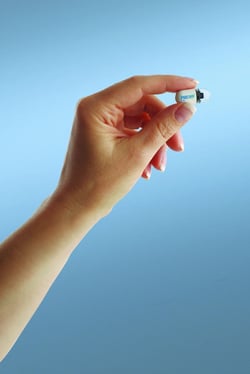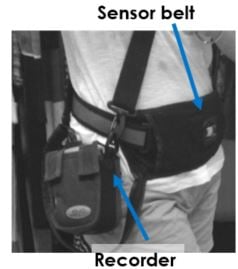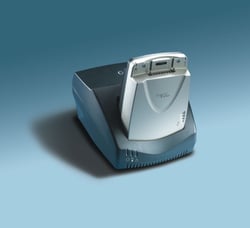What is capsule endoscopy? 
Capsule Endoscopy is a test that lets the doctor look at the small intestine. It may be done to look for bleeding or other problems in the small intestine. A tiny video camera inside a capsule is used. The camera starts once the recorder belt is attached to your child. The capsule is swallowed with water at the clinic, or it can be placed by your doctor with an endoscope during a procedure.
As the capsule moves through the small intestine the camera takes pictures and sends them to a recording device. When the test is done, the doctor uploads the images to a computer to see them.
Can anyone have this test?
Almost anyone can have this test. It is approved by the FDA for patients age 2 and older. It can be done on young children depending on their age and size. The capsule may be too big for a small child to swallow. In that case, the doctor may put it in the small intestine with an endoscope.If your child has a heart pacemaker or other electromedical device, tell the doctor. The doctor will decide if the test can still be done.
If the small intestine is too narrow from disease or swelling, the capsule could get stuck. This is very rare. Your doctor will discuss this risk with you. If needed, tests that look for narrowing in the intestine can be done before the test.
How do I prepare my child for the test?
The day before the test
- Your child may eat a regular breakfast and lunch.
- After 2 p.m. your child may only have clear liquids.
- Clear liquids include:
- Apple juice, white grape juice, ginger ale, powdered drink mixes such as Kool-aid® or Crystal Lite®, Jell-O®, or Popsicles® without real fruit juice.
- No red or purple colored liquids.
- No juices with pulp, like orange, pineapple, or grapefruit juice.
- Clear liquids include:
- Do not give any solid food, milk or milk products after 2 p.m. Food will affect the results of the test.
- Medicines may be taken as normal the day before the test.
The morning of the test
- Your child may have clear liquids until 4:30 a.m. Do not let your child eat or drink anything else after this time. This includes water, gum and hard candy.
- If your child is having the capsule endoscopy with a sedated procedure, they may be able to drink clear liquids until 2 hours before the procedure. A day surgery nurse will call you 2 to 3 days before the procedure with instructions. Follow those instructions.
- Do not give your child’s morning medicine. Bring them with you to the hospital.
- Have your child wear a light t-shirt that the belt and recorder can be placed over.
Please note: It is important to follow these special instructions. If your child eats or drinks anything after the times listed above, the test may be cancelled.
What happens during the test? 
Your child will wear a sensor belt around the waist. Sometimes the sensor belt is too big, so stickers are put on the abdomen instead. A recorder device is attached to the sensor belt or stickers. The recorder communicates with the capsule. Your child will be able to return to a normal routine that day. Your child will not be able to play sports or go to gym (phy. ed.) class while wearing the recorder. Any damage to the recorder could stop the test from being recorded properly. Eating is normally okay a few hours after the capsule is swallowed. You will be given more instructions about eating and taking medicines when the test starts.
Your child will leave the hospital while the camera is taking
the pictures. You will be asked to come back to the hospital that same day to have the sensor belt and recorder removed. It is very important to return all of the equipment on time to be sure that your child’s test is properly downloaded.
What happens after the capsule endoscopy?
What you can expect over the next two days:
• Comfort. New onset of severe pain, upset stomach or throwing up are not normal. Call if these are concerns.
• Diet. You may start your child’s normal diet. You will be given more information on eating and drinking when the test starts.
• Activities. Your child may do normal activities and exercise. The sensor belt or stickers cannot be removed until the study is completed.
• Medicines. Your child may start taking their normal medicines. Do not make up any missed doses. Just start with the normal dose.
• Other tests. Other tests, especially an MRI should not be done until the capsule has passed. If your child has an MRI scheduled, let the radiologist know. An x-ray may be needed to see if the capsule has passed before the MRI.
capsule has passed before the MRI.
• The capsule. The capsule will come out in the poop. Sometimes the capsule lights will still be flashing when it passes. Your child will most likely not know when it passes. The capsule can be safely flushed down the toilet or discarded with a diaper. It is okay if your child has not passed the capsule after 7 to 14 days. If you don’t think the capsule passed, and there are no symptoms, an x-ray can be taken after 7 to14 days to see if it passed.
• Results. A doctor will review the images. A summary of the results will be sent to your child’s doctor. The doctor will contact you with results. It takes about 10 to 14 days to do the full analysis. If you do not hear from your child’s doctor, please call their office.
Capsule endoscopy – Patient instructions
- Your child just swallowed a Wireless Capsule or had one placed by your child’s doctor during a procedure. This capsule contains a camera that will take pictures of your child’s intestines over the next few hours. These instructions contain information as to what to expect for the remainder of the day.
Time of capsule swallow/placement: ________
- Please return to the GI Clinic (4th floor Craig Yabucki Tower) today at the time you have been told to return the recorder and equipment. This is often 8 hours after swallowing or placement of the recorder. Check-in at the main desk and someone will meet you to take the equipment.
- If you have been told to return to the clinic after 5:00 PM: Pleas put the equipment in the blue "after hours" bin next to the check-in area.
Eating and Drinking
- Your child may drink CLEAR LIQUIDS starting at: _________ (2 hours post)
- Examples are water, apple juice, white grape juice etc.
- Your child may have a LIGHT LUNCH starting at: _________ (4 hours post)
- AVOID eating/drinking anything that contains red coloring in it.
- No red bell peppers, tomatoes or red sauces.
- The later the lunch the better. We want the capsule to take the best pictures possible, and sometimes too much food can limit what the capsule is able to see.
Medicines
- Your child may take their medicines starting at: _______ (2 hours post) unless told differently by your physician.
Activity
- Your child may return to normal activity, but should refrain from physical education class, heavy lifting or excessive exercise.
- Your child may walk, sit and lay down throughout the testing.
- The belt may be slightly loosened if using the bathroom is uncomfortable, but make sure it is in place snuggly over the belly button. DO NOT remove the belt or stickers.
- Your child must avoid MRI machines during the test.
- Your child can use a computer, radio, cell phone or hand held electronics.
- Your child should not stand directly next to another patient known to be undergoing a capsule endoscopy study.
Equipment management
- Avoid getting the data recorder, wires and any sensor stickers wet.
- Check the flashing light on the data recorder once an hour to ensure it is still flashing. If the light stops flashing, note the time you noticed this and contact the GI nurse line by calling 414-266-2850 between 8am-4pm.
- Do not expose the recorder to vibration or direct sunlight.
- All equipment must be returned in good conditions. You are held responsible for any damage.
If your child has persistent or severe abdominal pain, complaints of chest pain, develops a fever, has difficulty swallowing or you/your child has any other questions or concerns, please call the GI nurse at 414-266-3690 or GI Clinic front desk at 414-266-2850.
The capsule will pass in a bowel movement (BM) in the next few days. Your child will probably not be aware of it passing. Sometimes the capsule light will still be flashing when it passes. It does not need to be saved and can safely be flushed down the toilet.



